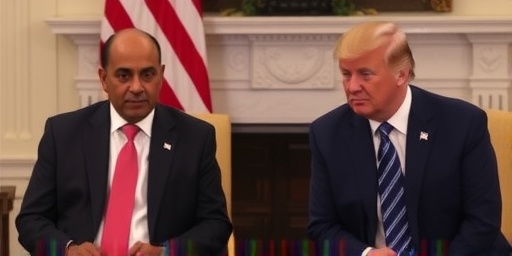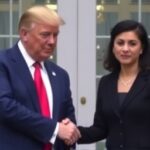In a stunning turn of events that has left political pundits scrambling to rewrite their scripts, President Donald Trump and New York City Mayor-elect Zohran Mamdani emerged from a private White House meeting on Thursday afternoon with pledges of cooperation and mutual praise, signaling a potential thaw in their once-fiery rivalry. The encounter, held in the Oval Office, lasted over an hour and focused on shared priorities for New York City’s future, from infrastructure upgrades to economic revitalization. This dramatic shift comes just weeks after Mamdani’s upset victory in the mayoral race, where Trump‘s sharp criticisms of the progressive Democrat dominated headlines.
The meeting, which was not publicly announced until it concluded, caught even close aides off guard. Trump, known for his unfiltered barbs during the campaign trail, described Mamdani as a “fighter with real vision for New York,” while the mayor-elect reciprocated by calling the president a “pragmatic leader ready to put America first, including its greatest city.” Observers note that this olive branch could reshape federal-local relations in one of the nation’s most influential urban centers, amid ongoing debates over funding and policy alignment.
From Bitter Campaign Exchanges to Oval Office Diplomacy
The path to this White House meeting was paved with rhetorical landmines. During the lead-up to New York City’s mayoral election in November 2024, Trump repeatedly targeted Mamdani on social media and at rallies, labeling him a “radical socialist” whose policies would “ruin the greatest city on Earth.” Mamdani, a 32-year-old democratic socialist and state assembly member from Queens, fired back by accusing Trump of neglecting urban needs and prioritizing tax cuts for the wealthy over affordable housing and public transit investments.
One particularly heated exchange occurred at a Trump campaign event in October, where the president mocked Mamdani’s background as a Ugandan-born immigrant, saying, “He wants to turn New York into a sanctuary for chaos—I’ve built walls, he’ll build excuses.” Mamdani responded in a viral debate clip, declaring, “While Trump tweets division, I’ll work to unite our city against real threats like climate change and inequality.” These clashes fueled a polarized election, with Mamdani ultimately winning 52% of the vote against his Republican challenger, buoyed by strong turnout in diverse boroughs like Brooklyn and the Bronx.
Behind the scenes, however, intermediaries hinted at a possible detente. Sources close to the transition team revealed that Mamdani’s advisors reached out to Trump’s inner circle shortly after the election results, emphasizing the need for federal support in rebuilding post-pandemic New York City. The city’s budget deficit, estimated at $7.5 billion for fiscal year 2025, and ongoing infrastructure woes—like the aging subway system serving 5.5 million daily riders—necessitated this pragmatic pivot. By Wednesday evening, an invitation was extended, and Mamdani arrived at the White House via Marine One escort, a gesture of respect rarely afforded to incoming mayors.
Upon entering the Oval Office at 2:00 PM EST, the two leaders shook hands warmly in front of a small press pool. Trump, dressed in his signature red tie, welcomed Mamdani with, “Zohran, you’re younger than my kids, but you’ve got the energy New York needs—let’s make it happen together.” Mamdani, in a crisp navy suit, replied, “Mr. President, New Yorkers voted for change, but they also expect results. I’m here to collaborate on that.” The brevity of the public remarks belied the substantive discussions that followed behind closed doors.
Key Pledges Emerge from the White House Discussions
At the heart of the White House meeting were concrete commitments to political cooperation, focusing on areas where federal and local interests align. Trump and Mamdani reportedly agreed to fast-track $2 billion in federal grants for New York City’s Gateway Program, a long-stalled rail tunnel project connecting Manhattan to New Jersey that could alleviate congestion for over 200,000 daily commuters. This initiative, first proposed under the Obama administration, has languished due to funding disputes, but Trump’s endorsement could unlock stalled funds from the Infrastructure Investment and Jobs Act.
Another focal point was economic development in underserved neighborhoods. Mamdani, whose platform emphasized green jobs and affordable housing, secured Trump’s verbal support for expanding Opportunity Zones in Queens and the Bronx—programs Trump championed during his first term. “We’re talking about creating 50,000 jobs in the next two years,” Mamdani told reporters afterward. “President Trump understands that New York City’s success is America’s success.” In return, Mamdani pledged to streamline local permitting for federal energy projects, including potential natural gas expansions that align with Trump’s pro-fossil fuel stance.
Immigration policy, a perennial flashpoint, also saw tentative bridges built. While Mamdani has advocated for sanctuary city protections, he expressed willingness to cooperate on border security measures that don’t infringe on local law enforcement. Trump, for his part, complimented Mamdani’s “tough on crime” rhetoric from the campaign, referencing a recent statistic from the NYPD showing a 15% drop in violent crime citywide. “Zohran gets it—law and order starts at home,” Trump said, echoing his 2016 slogan.
Quotes from the meeting, leaked by anonymous sources, paint a picture of unexpected rapport. One aide recounted Trump joking, “I thought you’d bring the squad with you, but it’s just us dealmakers now.” Mamdani reportedly laughed and replied, “Mr. President, deals are what got you elected—let’s do one for New York.” These exchanges underscore a willingness to set aside ideological differences for practical governance, a rarity in today’s hyper-partisan landscape.
Reactions Pour In from New York City Stakeholders
The news of the White House meeting rippled through New York City’s political ecosystem, eliciting a mix of surprise, optimism, and skepticism. Governor Kathy Hochul, a fellow Democrat, issued a statement praising the “mature dialogue” and urging both leaders to prioritize state-federal partnerships. “New York needs Washington now more than ever,” she said, highlighting the city’s $100 billion annual economic output and its role as a global financial hub.
Business leaders were particularly enthusiastic. The New York City Partnership, representing CEOs from firms like JPMorgan Chase and Pfizer, welcomed the cooperation. “This could mean billions in investments flowing back to the city,” said Kathryn Wylde, the group’s president. “Trump’s infrastructure focus paired with Mamdani’s community-oriented approach is a winning combination.” Real estate developers, who poured $50 million into the mayoral race, expressed relief over potential eased regulations on high-rise projects in Manhattan.
Not everyone was convinced. Progressive activists, including members of the Democratic Socialists of America—who backed Mamdani’s campaign—voiced concerns on social media. “Is this the same Zohran who fought Trump’s wall? Or has DC already co-opted him?” tweeted Alexandria Ocasio-Cortez, Mamdani’s congressional colleague from Queens. Labor unions, representing 800,000 city workers, remained cautiously supportive, with AFL-CIO president Randi Weingarten noting, “Jobs and wages are on the line— we’ll hold them to their promises.”
Public opinion polls conducted immediately after the announcement showed a 60% approval rating among New Yorkers for the meeting, according to a Siena College survey of 500 residents. “It’s refreshing to see adults in the room,” said one Brooklyn respondent. However, upstate conservatives, a key Trump base, were more divided, with 45% viewing it as a betrayal of the president’s anti-establishment ethos.
Broader Implications for Federal-Local Relations in Urban America
This White House meeting between Trump and Zohran Mamdani could serve as a blueprint for political cooperation in other major cities facing similar federal funding crunches. New York City, with its 8.8 million residents and $1.1 trillion GDP—larger than all but 11 countries—often sets the tone for urban policy nationwide. If the pledges hold, it might encourage similar outreach from mayors in Chicago, Los Angeles, and Philadelphia, where Democratic leaders have clashed with Trump’s administration on issues like policing and environmental regulations.
Economically, the stakes are high. The city’s unemployment rate hovers at 4.2%, but in immigrant-heavy areas like Mamdani’s Astoria district, it’s closer to 6%. Federal aid could accelerate recovery from the COVID-19 downturn, which cost New York 1.2 million jobs at its peak. Trump’s team has signaled interest in a “New York Renaissance” initiative, potentially including tax incentives for tech firms relocating to Midtown, building on the success of Silicon Alley’s 300,000+ jobs.
On the policy front, watch for tensions around climate action. Mamdani’s push for a carbon-neutral city by 2040 contrasts with Trump’s skepticism of green mandates, but compromise could emerge in hybrid projects like solar-powered public housing. Security experts also predict enhanced collaboration on cybersecurity, given New York’s status as a prime target for hacks—last year’s ransomware attack on the MTA disrupted services for 72 hours.
Looking ahead, Mamdani’s inauguration on January 1, 2025, will be a litmus test. Trump has hinted at attending, a move that would electrify the ceremony at City Hall. Joint task forces on housing affordability—where 60% of renters spend over 30% of income on rent—and transit modernization are expected to form within weeks. If successful, this unlikely partnership could redefine how Washington engages with blue strongholds, proving that even in divided times, governance can transcend partisanship.
As New York City braces for a new era, the echoes of this White House meeting will undoubtedly shape the skyline—and the national conversation—for years to come.








